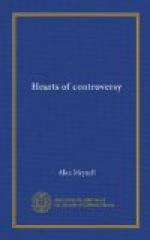Yet the danger has in fact proved real within the
present and recent years, and seems about to threaten
still more among the less judicious. But it
will not long prevail. The vigorous little nation
of lovers of poetry, alive one by one within the vague
multitude of the nation of England, cannot remain
finally insensible to what is at once majestic and
magical in Tennyson. For those are not qualities
they neglect in their other masters. How, valuing
singleness of heart in the sixteenth century, splendour
in the seventeenth, composure in the eighteenth; how,
with a spiritual ear for the note—commonly
called Celtic, albeit it is the most English thing
in the world—the wild wood note of the
remoter song; how, with the educated sense of style,
the liberal sense of ease; how, in a word, fostering
Letters and loving Nature, shall that choice nation
within England long disregard these virtues in the
nineteenth-century master? How disregard him,
for more than the few years of reaction, for the insignificant
reasons of his bygone taste, his insipid courtliness,
his prettiness, or what not? It is no dishonour
to Tennyson, for it is a dishonour to our education,
to disparage a poet who wrote but the two—had
he written no more of their kind—lines
of “The Passing of Arthur,” of which, before
I quote them, I will permit myself the personal remembrance
of a great contemporary author’s opinion.
Mr. Meredith, speaking to me of the high-water mark
of English style in poetry and prose, cited those
lines as topmost in poetry:-
On one side lay the ocean, and on
one
Lay a great water, and the moon
was full.
Here is no taint of manner, no pretty posture or habit,
but the simplicity of poetry and the simplicity of
Nature, something on the yonder side of imagery.
It is to be noted that this noble passage is from
Tennyson’s generally weakest kind of work—blank
verse; and should thus be a sign that the laxity of
so many parts of the “Idylls” and other
blank verse poems was a quite unnecessary fault.
Lax this form of poetry undoubtedly is with Tennyson.
His blank verse is often too easy; it cannot be said
to fly, for the paradoxical reason that it has no weight;
it slips by, without halting or tripping indeed, but
also without the friction of the movement of vitality.
This quality, which is so near to a fault, this quality
of ease, has come to be disregarded in our day.
That Horace Walpole overpraised this virtue is not
good reason that we should hold it for a vice.
Yet we do more than undervalue it; and several of
our authors, in prose and poetry, seem to find much
merit in the manifest difficulty; they will not have
a key to turn, though closely and tightly, in oiled
wards; let the reluctant iron catch and grind, or
they would even prefer to pick you the lock.




